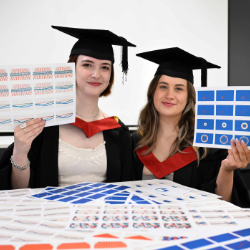-
Study
-
UCAS Clearing 2024
- Clearing Courses
- The Clearing Process
- UCAS Tariff Points
- Clearing 2024 FAQs
- Confirmation
- Clearing Virtual Event
-
Undergraduate
- Search for a Course
- Undergraduate Open Day & Events
- Application Guides
- Northumbria University UCAS Exhibitions
- Foundation Years
- Undergraduate Fees & Funding
- School & College Outreach
- Continuing Professional Development
-
Postgraduate
- Postgraduate Study Degree
- Postgraduate Research Degrees
- Postgraduate Open Days and Events
- Postgraduate Fees & Funding
- Flexible Learning
- Thinking about a Masters?
- Continuing Professional Development
- Change Direction
-
Student Life
- The Hub - Student Blog
- Accommodation
- Life in Newcastle
- Support for Students
- Careers
- Information for Parents
- Students' Union
- Northumbria Sport
-
-
International
International
Northumbria’s global footprint touches every continent across the world, through our global partnerships across 17 institutions in 10 countries, to our 277,000 strong alumni community and 150 recruitment partners – we prepare our students for the challenges of tomorrow. Discover more about how to join Northumbria’s global family or our partnerships.
View our Global Footprint-
Applying to Northumbria
- European Union
- Our London Campus
- Northumbria Pathway
- International Events
- Entry Requirements and Country Representatives
- Regional Offices
-
Northumbria Language Centre
- Faculty Requirements
- Acceptable English Requirements
- Pre-Sessional English and Study Skills
- Academic Language Skills Programmes (ALS)
-
International Fees, Funding & Scholarships
- International Undergraduate Fees
- International Undergraduate Funding
- International Masters Fees
- International Masters Funding
- International Postgraduate Research Fees
- International Postgraduate Research Funding
- International Money Matters
-
Life at Northumbria
- International student support
- Careers
-
International Mobility
- Current Northumbria Students
- Incoming Exchange Students
-
-
Business
Business
The world is changing faster than ever before. The future is there to be won by organisations who find ways to turn today's possibilities into tomorrows competitive edge. In a connected world, collaboration can be the key to success.
More on our Business Services -
Research
Research
Northumbria is a research-rich, business-focused, professional university with a global reputation for academic quality. We conduct ground-breaking research that is responsive to the science & technology, health & well being, economic and social and arts & cultural needs for the communities
Discover more about our Research -
About Us
-
About Northumbria
- Our Strategy
- Our Staff
- Place and Partnerships
- Student Profiles
- Alumni Profiles
- Leadership & Governance
- Academic Departments
- University Services
- History of Northumbria
- Contact us
- Online Shop
-
-
Alumni
Alumni
Northumbria University is renowned for the calibre of its business-ready graduates. Our alumni network has over 237,000 graduates based in 178 countries worldwide in a range of sectors, our alumni are making a real impact on the world.
Our Alumni - Work For Us
What will I learn on this module?
All musicians are music teachers of their instrument or voice at some point, and it is vital that their experience of teaching is based on a solid foundation of pedagogical research and a knowledge of the context in which their work is taking place.
This module offers an introduction to music education, covering early years, primary, secondary and special schools, so that your music teaching will be informed by your knowledge of pupils’ broader educational experience. This will also open up other possible career paths in music education.
How will I learn on this module?
You will be introduced to music education in a series of lectures, exploring the theories which underpin music education in the UK, and via placement visits to observe music teaching where you will benefit from conversing with professionals from different education organisations.
How will I be supported academically on this module?
You will be given considerable support and encouragement by those teaching on the course. The programme leader and Course Tutors will be on hand to offer help and guidance, either in person during the advertised office hours or via email, and you will be working in an environment where you and your peers will offer one another mutual support and honest critical appraisal. You will be given appropriate material both in class and via the eLearning environment. You will be expertly guided during the external visits to observe teaching in various educational establishments.
What will I be expected to read on this module?
All modules at Northumbria include a range of reading materials that students are expected to engage with. The reading list for this module can be found at: http://readinglists.northumbria.ac.uk
(Reading List service online guide for academic staff this containing contact details for the Reading List team – http://library.northumbria.ac.uk/readinglists)
What will I be expected to achieve?
Knowledge & Understanding:
1. You will develop an understanding of how to teach your instrument or voice to a beginner.
2. You will demonstrate a knowledge and understanding of the key concepts, principles and approaches to teaching and learning music.
3. You will know and understand how music education fits into a broader curriculum in schools.
Intellectual / Professional skills & abilities:
4. You will develop skills in teaching your instrument/voice.
Personal Values Attributes (Global / Cultural awareness, Ethics, Curiosity) (PVA):
5. You will demonstrate a capacity for independent, self-motivated learning and time management through regular practice.
How will I be assessed?
1. Lesson plan of 1,000 words for teaching a beginner over 7 lessons (20%). MLOs: 1, 2, 3, 4, 5
2. Presentation of 10mins focussing on your approach to teaching your instrument/voice (30%). MLOs: 1, 2, 3, 4, 5
3. Essay of 1,500 words on a topic related to the Education lecture input and teaching observation days (50%). 1, 2, 3, 5
You will receive written feedback on your lesson plan in preparation for your completion of the presentation.
You will receive written feedback on your presentation.
You will receive written feedback on your essay, comprising annotations to your script and a short report.
Pre-requisite(s)
Entry to BA (Hons) programme
Co-requisite(s)
N/A
Module abstract
All musicians teach at some point in their careers, so this module introduces you to the world of Music Education. Music teaching, whether classroom or specialist instrumental/vocal lessons in groups or 1-to-1, is interconnected, sharing a key set of skills and underpinned by broader music and universal pedagogical theories and techniques. Music education therefore does not take place within a vacuum, and when it comes to teaching children or adults it is important to understand the context of music within education. This module introduces you to the fundamentals of music education, equipping you with the skills to take your first steps into teaching your instrument/voice, and familiarising you with the basics of teaching a class. The module is delivered as a blend of theory with practical discussions, and includes external visits to schools to observe music teachers in action.
Course info
UCAS Code W320
Credits 20
Level of Study Undergraduate
Mode of Study 3 years Full Time or 4 years with a placement (sandwich)/study abroad
Department Humanities
Location City Campus, Northumbria University
City Newcastle
Start September 2024 or September 2025
All information is accurate at the time of sharing.
Full time Courses are primarily delivered via on-campus face to face learning but could include elements of online learning. Most courses run as planned and as promoted on our website and via our marketing materials, but if there are any substantial changes (as determined by the Competition and Markets Authority) to a course or there is the potential that course may be withdrawn, we will notify all affected applicants as soon as possible with advice and guidance regarding their options. It is also important to be aware that optional modules listed on course pages may be subject to change depending on uptake numbers each year.
Contact time is subject to increase or decrease in line with possible restrictions imposed by the government or the University in the interest of maintaining the health and safety and wellbeing of students, staff, and visitors if this is deemed necessary in future.
Useful Links
Find out about our distinctive approach at
www.northumbria.ac.uk/exp
Admissions Terms and Conditions
northumbria.ac.uk/terms
Fees and Funding
northumbria.ac.uk/fees
Admissions Policy
northumbria.ac.uk/adpolicy
Admissions Complaints Policy
northumbria.ac.uk/complaints














